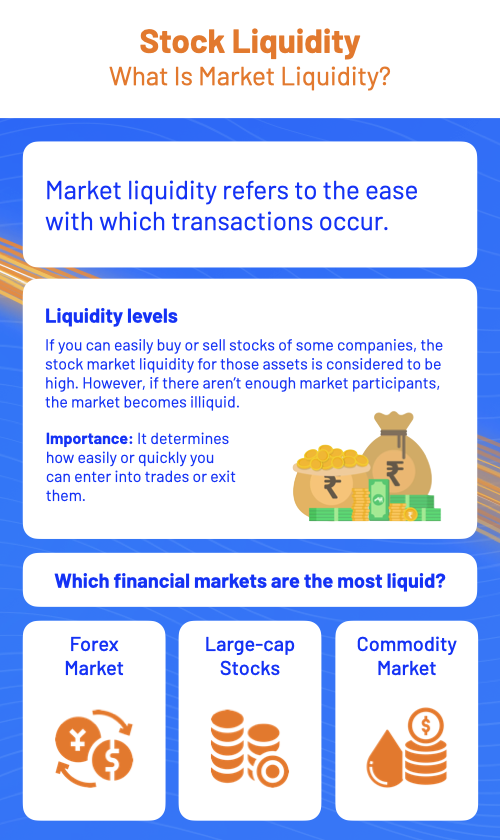When it comes to the financial markets, there are many important concepts that you should be aware of before you enter into the trading ring. Among these, the concept of market liquidity is particularly important. It influences everything, from large cap stocks are among the most liquid assets. how easy it is to execute your trades to how much you gain as a return on your investment.
Since this phenomenon is so important, it is essential that you have a good understanding of what market liquidity is and get to know which markets are liquid or illiquid. For instance, what is stock market liquidity like? Is it the most liquid market, or are there markets that rank higher on the liquidity scale? Before we get into those details, let’s begin with the market liquidity definition.
What is market liquidity?
Liquidity refers to the ease with which an asset can be bought and sold at stable prices. Buying and selling occurs when demand and supply are present in adequate quantities. If the number of buyers is more than the number of sellers, the supply will be lower. Conversely, if there are more sellers than buyers, there will not be enough demand. These market scenarios result in lower liquidity.
In other words, market liquidity refers to the ease with which transactions occur. If you can easily buy or sell assets in a market, it means that there are enough buyers and sellers present at all times, making it effortless for you to enter into a trade. For instance, if you can easily buy or sell stocks of some companies, the stock market liquidity for those assets is considered to be high. However, if there aren’t enough market participants, the market becomes illiquid.

Why is market liquidity important?
Now that you’ve caught upon the market liquidity definition, it’s time to get to know why this concept is so important. To begin with market liquidity is important because it determines how easily or quickly you can enter into trades or exit them. If a market is liquid, it’s easier to buy or sell assets because there are enough participants in the market to transact with.
This is particularly important when the market is moving negatively, and you wish to exit a position. For instance, if the stock market liquidity is high, then you can easily sell the shares of a company that may be moving in the direction that gives you losses. However, if the liquidity is low, exiting your position may not be easy enough, and you’ll be forced to bear more losses than expected.
Liquid markets also make it easier for buyers and sellers to find participants who are willing to transact at the prices they prefer. So, buyers in a liquid market will not have to suffer purchasing assets at higher prices, and sellers in a liquid market will not have to heavily discount the price of the assets they’re selling.
Consequently, another important thing to note is that when the market liquidity is high, the bid-ask spread is tighter. In other words, the difference between the lowest price at which a seller is willing to sell the asset and the highest price that a buyer is willing to pay for it is smaller.
Which financial markets are the most liquid?
Liquidity in the financial markets is not constant across the different types of markets therein. The forex market is easily the most liquid, because it includes participants from all over the world. Aside from retail traders, this market also includes a variety of other major participants like governments, banks, insurance companies, investment houses, and people converting foreign currencies before or after a trip abroad.
Similarly, with regard to stock market liquidity, large cap stocks are among the most liquid assets. Large cap companies are basically companies with a high market capitalization. These companies generally tend to be traded frequently on the exchange, and so, they are highly liquid. It’s often quite easy to buy or sell the stocks of these large cap companies quickly and without too much trouble.
And lastly, the commodity market is also a very liquid space. This is particularly because of the rise of the derivative segment in the commodity market. Commodity futures and commodity options are quite easy to trade, given that the market is generally teaming with buyers and sellers.
Conclusion
Now that you know all these details about market liquidity, it’s important to keep in mind that liquidity is one of the influencing factors in trading. So, before you trade in any given market, do a quick analysis of the market’s liquidity and align your trade expectations accordingly.

